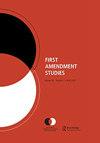When “Like”-Minded People Click: Facebook Interaction Conventions, the Meaning of “Speech” Online, and Bland v. Roberts
Q2 Social Sciences
引用次数: 6
Abstract
In Bland v. Roberts, a public-sector employee sued because he was fired for clicking the Facebook “Like” button on the campaign Website of his employer’s re-election rival. The judge dismissed the free-speech claim stating that “Liking” Web content is not “sufficient” speech to warrant constitutional protection. Employing relevance theory, we explored whether Facebook users’ attitudes and practice indicate the expectation of free-speech protection. Data collected included participants’ “Liking” habits and attitudes about whether “Liking” communicates a message. Two-thirds of the respondents agreed on the meaning of a “Like,” and 81.6% of respondents believed that “Liking” something is communicating a message.当“喜欢”的人点击:Facebook互动惯例,在线“演讲”的意义,以及布兰德诉罗伯茨案
在Bland v. Roberts一案中,一名公共部门雇员提起诉讼,因为他在Facebook上点击了其雇主竞选对手竞选网站上的“Like”按钮而被解雇。法官驳回了言论自由的主张,称“点赞”网络内容不足以构成宪法保护的“充分”言论。运用关联理论,我们探讨了Facebook用户的态度和行为是否表明了对言论自由保护的期望。收集的数据包括参与者的“点赞”习惯,以及对“点赞”是否传达了信息的态度。三分之二的受访者同意“点赞”的含义,81.6%的受访者认为“点赞”是在传递信息。
本文章由计算机程序翻译,如有差异,请以英文原文为准。
求助全文
约1分钟内获得全文
求助全文
来源期刊

First Amendment Studies
Social Sciences-Law
自引率
0.00%
发文量
0
期刊介绍:
First Amendment Studies publishes original scholarship on all aspects of free speech and embraces the full range of critical, historical, empirical, and descriptive methodologies. First Amendment Studies welcomes scholarship addressing areas including but not limited to: • doctrinal analysis of international and national free speech law and legislation • rhetorical analysis of cases and judicial rhetoric • theoretical and cultural issues related to free speech • the role of free speech in a wide variety of contexts (e.g., organizations, popular culture, traditional and new media).
 求助内容:
求助内容: 应助结果提醒方式:
应助结果提醒方式:


